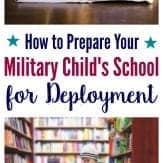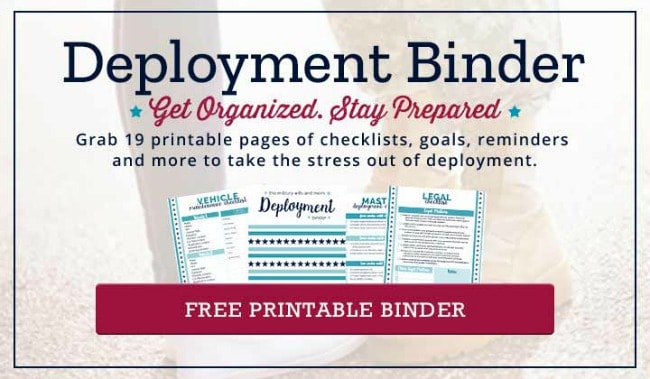Inside: Learn 4 simple ways you can prepare your military child’s school for deployment. Improve support and keep strong relationships with teachers.
Seabags and SAPI plates are strewn around your living room. All of the uniforms are being washed. You are scheduled out for the next few months so that everyone stays nice and busy. And your kids have special comfort objects to help cope.
Your family is all set to survive, if not thrive, through this deployment.
Except that you forgot to let the school know.
A lot of military families skip this super important deployment prep step. Teachers? Why do they need to know? But teachers are spending over eight hours a day, five days a week with your kiddos. That’s a lot of time.
Related: Best Toys and Resources to Help Military Kids During Deployment
Set up a meeting.
This is the first step to prepping your child’s school for deployment. Ask for a sit-down meeting with your child’s teacher shortly after you are informed of the upcoming deployment. If the separation is scheduled to start during summer vacation, book that conference as soon as possible after school begins.
At the parent-teacher meeting, share as much as possible while respecting OPSEC:
- general beginning and ending dates
- general length in months
During your conference, you should also touch on things that you have noticed about your child during previous deployments. Even if your child was not in school last time, there might have been emotional or behavioral signs of stress or overwhelm. Letting the teacher know about this will definitely help down the road.
Make a plan.
During your first meeting, try to figure out plans of action just in case there are a few hiccups at school. Often children respond to stress differently in different places. So, your child might be perfectly fine at home but acting out at school. Other signs of distress are slipping grades, withdrawing from friends and activities, and personality changes like becoming very quiet or aggressive.
Related: How to Help a Child Focus in the Classroom – 5 Things Parents Can Do
Work with the teacher to decide what you will do, together, if your child appears to be stressed out or acting differently in school. These plans are different for every child, but some good options could be:
- talking to a counselor, therapist, or religious leader
- hiring a tutor
- working through stress with creative expression
- exercise
- work breaks at school
- making a connection between their deployed parent and their classroom
Stay in touch.
Throughout your child’s K-12 journey, staying in touch with the teacher is super important. During deployment, it is especially vital.
Related: 7 Best Army Toys for Kids to Use During Deployment
Your child’s teacher might be the first person to notice personality changes, slipping grades, or other signs of stress. Send a weekly or bi-weekly email just to check in. Tell the teacher what you have been noticing at home, especially with academics, activities, social life, or behavior. If you are able to share information about the deployment, like homecoming dates or extensions, include that as well. Once the teacher has a little bit of insight into your life, it is easier for him to help your child at school.
If you notice something very out of the ordinary at home, let the teacher know. The same is true if you notice that grades have dropped off sharply, like A’s turning into D’s. Your child’s teacher might be able to offer behavior management suggestions or guide you to help for poor grades.
Even if there are no concrete solutions immediately, communicating with the teacher means that you have an ally. You can team up to make sure that your child is succeeding at home and at school.
Build connections.
If you live on or near a military base, there is a high chance that other families are navigating deployments, too. Ask the school or teacher if there are any ways to help parents and children make connections.
Forming an after-school club for children with deployed parents can help children to share feelings and make new friends. This could also be a great opportunity for the school counselor and teachers to offer help or simply observe behavior patterns. Parents could meet for coffee or playground dates to build friendships and find resources. You and your child might find new friends in your spouse’s unit! Maybe joint homecoming countdowns are in your future.
Making connections to a deployed unit can help non-military children understand military life. Ask the teacher if your child’s class can “adopt” your spouse’s unit. Around holidays, the children could build care packages or write letters to send to the deployed troops. This can help your child feel even more supported or loved. Plus it takes some of the care package stress off of you!
If you don’t tell.
Best case scenario: your child and family sail through deployment. There are no behavioral changes, no stress, and grades remain stable. You have no worries and no problems.
Worst case scenario: everything hits all at once. Your child could be showing signs of stress at school, but the teacher is slow to act because she hasn’t been alerted. Those awesome grades take a nosedive, but because no one knows about the deployment the teacher doesn’t spring into action.
Letting your teacher know about the deployment, and developing a plan, will help everyone move faster towards positive solutions.
More on Military Kids + School
- How to Help Your Military Child Adjust to a New School
- 9 Free Education Resources and Programs for Military Kids
- Dear Teacher of Military Children
- The Ultimate PCS Checklist for Changing Schools With Military Kids
- Best Customizable School Night Routine for Kids
More on Military Life
- 10 Things Military Spouses Won’t Tell You About Deployment
- The Pain of Saying Goodbye to Your Military Spouse Tribe
- 47 Things No One Tells You About Being a Military Wife
- How to Make Your Own Daddy Doll for Military Kids (Tutorial)










Leave a Comment